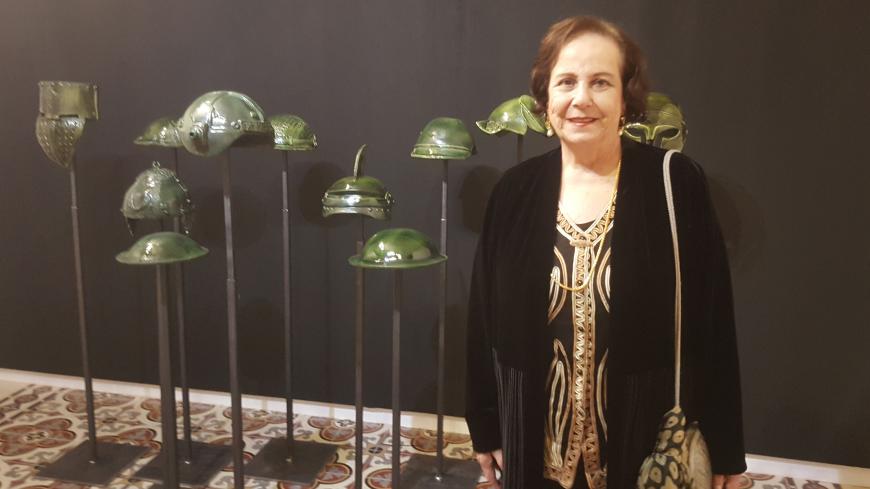RAMALLAH, West Bank — In front of a solemnly dark wall, eleven military helmets and face guards rest atop metallic rods, conjuring images of heads on sticks, perhaps severed in battle. In Vera Tamari’s powerful piece “Warriors Passed by Here,” each piece of glazed ceramic headgear represents the army of a conqueror that ruled Palestine, her home and a frequent focus of her work.
The Jerusalem-born Tamari works primarily with clay to create sculptures, bas-reliefs and “sculptured paintings,” in which the curves of the female body symbolize land and nature. At the age of 30, Tamari became the first artist to open a ceramics studio on the West Bank, in 1975, in al-Bireh, near Ramallah. Her latest exhibition, also titled “Warriors Passed by Here,” can be seen at Gallery One, in the Khalil Sakakini Cultural Center in Ramallah.
The show, featuring 40 pieces of her work, includes Tamari's well-known ceramics figures along with a series of watercolors, which, she explained, are reflections of her personal memories of the land, the people and the history of Palestine.
A curator and an academic, Tamari received her undergraduate degree from Beirut College for Women in 1966 and later studied ceramics in Florence, in 1974. She eventually taught for more than 20 years at Birzeit University, in Ramallah, focusing on art history, art, and Islamic art and architecture, the latter in which she received a master's from Oxford University in 1984. Tamari also helped establish and later ran the Ethnographic and Art Museum at Birzeit between 2005 and 2010.
“I focused on ceramics for a long time, but also enjoyed drawing landscapes,” Tamari told Al-Monitor. Her watercolor landscapes depict idyllic scenes in soft colors painted with straight strokes of the brush. The images are largely based on her memories but also colored with dashes of imagination.

Some of Vera Tamari’s signature porcelain female torsos on display at Gallery One, Ramallah, 2019.
“When I started to draw the scenes of nature that were buried in my memory on washi [soft Japanese paper], I felt that my drawings had become more poetic, more idealized," Tamari told Al-Monitor. "It contrasted with my previous work, which had shown nature damaged, the harm done to nature, land, and history. I realized that the idealized land [of Palestine] had faced many wars, invasions and occupations by different armies, so I wanted to represent its history by creating military helmets. Each helmet embodies an empire, a state or an army.”
She continued, “I researched empires that ruled Palestine, from the Bronze Age to the Roman and Greek civilizations, the British colonization and the Israeli occupation to find the helmet of each army before creating it in the ceramic form then vitrifying it.”
Tamari said she deliberately made the helmets out of clay from the land, which as a ceramic becomes a fragile material, although soldiers’ helmets, made of iron, were tough. “I wanted to show that even the iron helmets can be destroyed with time, but the land, the soil, remains,” she said.
The paintings in the Ramallah show do not contain human figures — Tamari readily admits that abstract, non-figurative art interests her more — but the human form is represented in her signature female torsos in porcelain, which are inspired by the hills and fertile land of Palestine.
Gallery One curator Samar Martha told Al-Monitor that the exhibition marks the end of Tamari’s 19-year absence from the exhibition scene in Palestine. In the interim, the artist taught school while producing work in her studio. She also explained that both the artist and the gallery were pleased with attendance at the opening of the show.
“Warriors Passed by Here” demonstrates that although Tamari has long focused on ceramics to tell the story of Palestine, she can do it equally well with other forms of art. The exhibition runs through Jan. 12, 2020.








